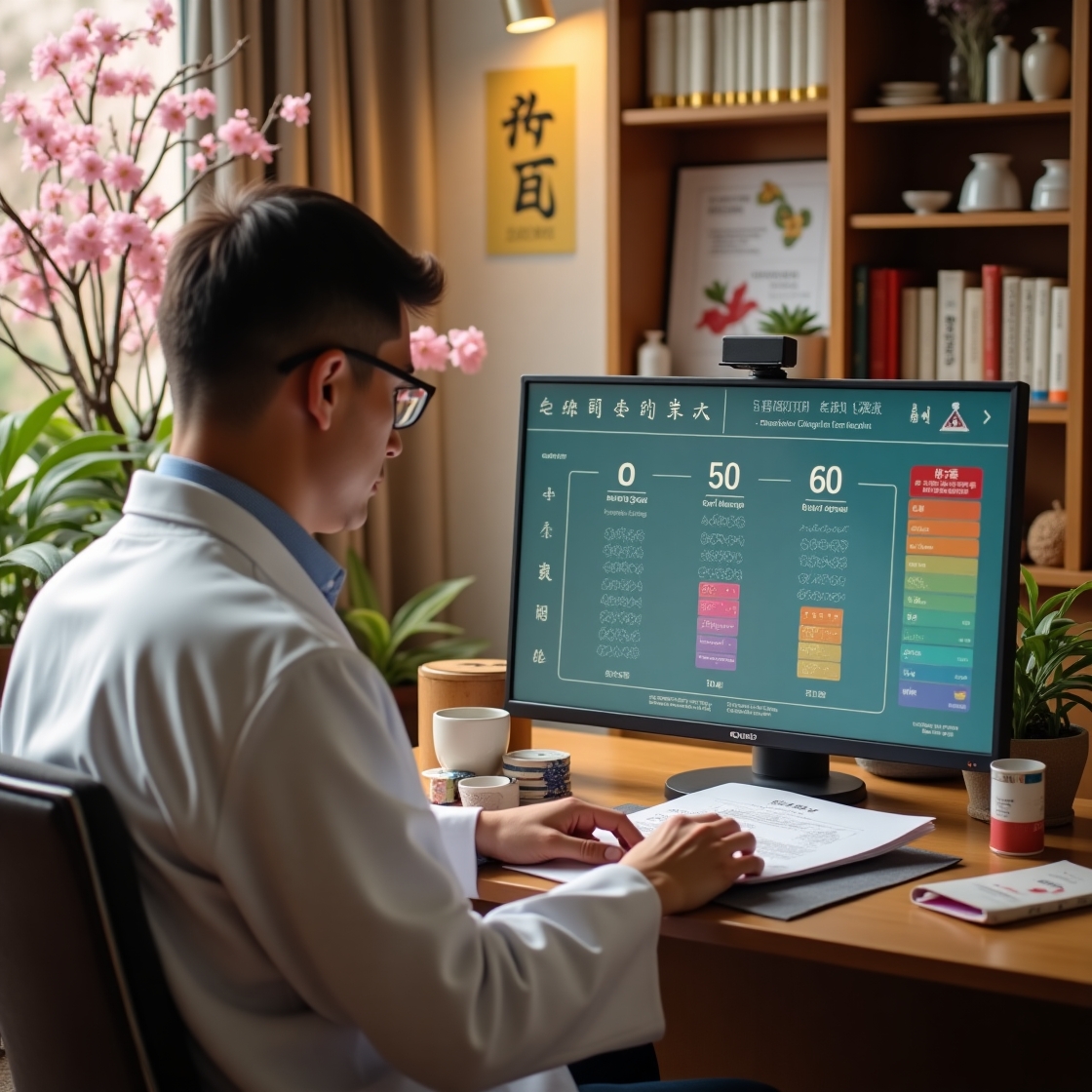一、中医健康观的核心:四维自测法
1. 健康四大指标的科学依据
- 《素问·上古天真论》:“食饮有节,起居有常,不妄作劳。”
- 现代医学验证:
- 肠道菌群与代谢疾病关联性(Nature研究证实)
- 睡眠障碍导致免疫力下降30%(WHO数据)
行医这些年,我发现大多数人缺乏对“健康”的认知,只有在出问题时才想到要去找医生,消炎止痛,当时控制了一下症状,没事了以为病就好了,实际过一段时间又出现反复.
有一件事需要我们反思:现代那么多慢性病和癌症,这么多慢性病到底可不可以根治?癌症可不可以提前预防?
其实这两个大议题,就是中医一直擅长的“治未病”。我们作为普通人,首先要有认识自己身体是否健康的觉悟,这样在出现“亚健康”的时候,就知道提前调理。
最理想的健康状态是什么样的呢?要看四点:吃饭,睡觉,大小便,精神情志。这四个方面学问可不少。
2. 四大指标与脏腑功能对应关系
| 指标 | 关联脏腑 | 失衡表现 |
|---|---|---|
| 吃饭 | 脾、胃、肝、胆 | 食欲不振/暴饮暴食/嗳气 |
| 睡眠 | 心、肝、肾 | 失眠多梦/易醒/盗汗 |
| 大小便 | 脾、肾、大肠 | 便秘/腹泻/小便浑浊 |
| 精神情志 | 心、肝、脾 | 焦虑/易怒/情绪低落 |
二、四大指标深度解析与调理指南
1. 吃饭:脾胃功能的晴雨表
- 正常表现:
- 定时饥饿感(辰时胃经当令)
- 吃饭没有明显偏食,不会过于偏辣和重油重盐。薄滋味而依然觉得有滋味。这是正常味觉。
- 食欲稳定,吃饭只吃7分饱,不觉得容易饿,也不会觉得非要吃撑了才觉得饱。这是正常饭量。
- 异常信号:
- 1,早上没有饥饿感:胃,肝,胆不利。食物经过一个晚上的运化都没有从胃里完全排空,导致没有饿感。长期如此,容易出现胆结石。
- 2,没有味觉,口味重:脾虚,脾虚则清气不升,口中没有足够的津液,所以口里感觉没有味道,很多大人吸烟,小儿好吃零食,与此有关。
- 3,晚上会饿,要饱食才能入睡:脾胃肾虚:中气不足,又有胃热。吃的食物不能有效转为中气,也就是说的“不顶饿”。长期如此,会形成慢性胃炎。
- 4,经常嗳气,有口气:脾胃不运,食物不消化而有积热。多伴下焦不通,肠胃打屁少,所以浊气上行而不能下降。
胃不好,最开始是慢性浅表性胃炎,加重后成糜烂性胃炎,再重成萎缩性胃炎,再肠化生,最后胃癌。
一切重病都是从慢性病渐渐发展来的。为何控制不了。因为光靠消炎药,止痛片是不能真正解决问题的,只是延缓了发展的时间,因为延误了治疗根本,也间接导致了慢慢发展。因为一切炎症的标症是炎症,根本是因为臟腑功能不正常。只有把功能恢复正常了,才算真正治好了。这就是中医“治未病”的标准。
吃饭正常否,关系到整个消化系统和气血是否充足。很多人找医生把脉,医生都会说你气血不足。为何这么多气血不足呢?这就跟脾胃,跟吃饭有很大关系。若你吃饭正常,首先就不用担心脾胃胆胰有大问题,也不用担心身体因为消化不好导致气血不足。
- 症状病机舌象与调理方案:
- 肝胆郁热、舌边红、苔黄腻;柴胡疏肝散+早餐小米粥
- 食欲亢进、胃火炽盛、舌红、少苔;玉女煎+按压内庭穴
- 嗳气、有口气;脾虚湿滞、舌淡胖齿痕;参苓白术散+陈皮代茶饮
2. 睡眠:阴阳平衡的关键窗口
- 正常表现:
- 1,晚上10点多开始有睡意。可以开始睡觉,躺下后不出10分钟就能迅速睡着,且可以一觉到天亮。
- 2,年纪偏大者30分钟内慢慢睡着,晚上起夜2次以内,小便量正常,完后又能很快睡着,一觉到天亮。
- 3,睡眠时间一般在晚上10-11点至早上6-7点(北京时间)。天冷可以适当多睡一会。
- 异常信号:
- 常见不正常的情况:
- 1,起夜过多:脾肾阳虚。很多人会去吃六味地黄丸,但吃错了方向,这时候应该以补肾阳为主,六地是以补肾阴为主的。且很多时候不是单纯的肾虚,而是脾肾阳虚。
- 2,晚上固定时间段易醒:12点醒,或者过12点则通宵失眠:胆有问题。3点左右醒:肝有问题。4-5点醒:肾阴虚。
- 3,入睡困难:长期熬夜或年纪偏大的人易出现,正常是11点开始能够进入深度睡眠。若睡不着,多跟肝胆火旺有关。若心中有事则入睡难,多心血瘀阻。
- 4,多梦易醒:多心肝火旺。若做噩梦或梦见的多是已故之人,则是阳气虚。
- 5,盗汗:多阳虚不固或阴虚有热。
- 6,醒后没精神:睡眠不深,多血虚阴虚。
- 睡眠有问题,是当下很常见的现象。若睡眠质量不高,往往人就像熬夜,虽然白天很辛苦,晚上还是恢复不了。
- 有的人以为白天补觉和晚上一样,实际上是不可替代的。偶尔熬夜,白天补觉尚可以。长期如此,一样还是耗损肝肾。
- 肝肾亏虚则根本亏虚。一切抵抗力,免疫力的根基都会受损。比如常见有的患者感觉自己的慢性病服中药好像总没有别人有效果,好得慢。其实跟肝肾不足有很大关系。
- 一定要重视睡眠。
- 常见不正常的情况:
- 子午流注与睡眠:
- 21-23点三焦经当令:准备入睡
- 1-3点心包经当令:深度修复期
- 失眠调理方案:
- 入睡困难(肝火旺):龙胆泻肝丸+太冲穴按摩
- 凌晨易醒(肾阴虚):左归丸+涌泉穴贴敷吴茱萸粉
3. 大小便:排毒系统的健康密码
- 正常表现:
- 1,每天早上7-9点大便一次,最理想的是长条,较粗,色黄,成型香蕉样大便。每天早上只有这一次大便。
- 2,小便不会有尿频,尿急,尿不尽,不用起夜,不需要尿等待,特殊情况能憋得住尿。尿色清,吃了重口味的尿色黄也正常。
- 异常信号:
- 1,沾马桶:湿气重
- 2,没有便意:脾肾阳虚
- 3,便秘:正常来说,1-2天能有一次大便。若没有,则算便秘。说到便秘,原因就多了,很多人都会坚持吃水果,香丹清之类帮助通便。但大多数人便秘是因为阳气不足,肠胃不运。这样的方法都是治标不治本的。所以即使通便了,但下次不吃又便秘。
- 4,长期腹泻:也就是慢性肠炎,现代医学说是肠道有炎症。中医来看就是肠胃不运化,该排出去的湿、寒、热没有及时排出去。有的人长期喝酒,一喝完就会腹泻,也是跟肠胃湿热过重,脾肾阳虚有密切关系。
- 大小便不正常,则意味着人排泄废物的功能出问题。常常带来的影响是全身性的。
- 比如长期便秘导致浊气不降,而见皮肤暗沉,鼻炎一直不愈。(肺与大肠相表里)
- 小便关系到水液代谢。水液代谢不了意味着人容易肥胖。这种胖往往是因虚而胖。这种胖减肥不易,若不真正扶补阳气,也容易反弹。
- 排便黄金标准:
- 晨起香蕉便(长度15-20cm,直径3cm)
- 排便时间<5分钟,无残留感
- 便秘危害与对策:类型成因舌象调理方案
- 热秘:肠胃积热、舌红苔黄燥;麻子仁丸+决明子茶;
- 气秘:肝郁气滞、舌淡红苔薄;白六磨汤+揉腹顺时针50次;
- 虚秘:气血两虚、舌淡苔薄;黄芪汤+艾灸足三里
4. 精神情志:阳气盛衰的晴雨计
- 正常表现:
- 精神保持愉悦,心情平和,不易动怒,不易焦虑,说话做事有条不紊,进退有据。有较强的自控能力,少负面情绪,即便有也能较快的调节,不会随意迁怒。
- 异常信号:
- 1,多怒:不论事情大小,总是控制不住自己的脾气,发火的时候没有节制,说话刻薄伤人,完后又易后悔,虽然把气发出来总比憋心里好,但发脾气仍然耗伤元气。
- 2,多忧虑:总为没有发生的事情担忧,甚至茶饭不思。多致脾胃虚弱,消化积食。
- 3,多焦虑:比忧虑更多了肝气郁结。
- 4,多负能量:容易曲解别人善意,或者对很多人事物不加分辨的充满敌意,包括极度的排斥心理。除开内心缺乏安全感,从身体健康角度来说,还是阳气不足,心阳不足的人,思想缺乏定力,没有主见,易情绪。
- 情绪与脏腑关联:
- 怒伤肝(左关脉弦)
- 忧思伤脾(右关脉濡)
- 情志调理法:
- 焦虑多梦:甘麦大枣汤+神门穴按压
- 易怒暴躁:逍遥丸+太冲穴刺络放血
除开以上四个方面。其实还有很多重要的指标:比如月经,出汗,口干,是否易感冒,怕冷怕热等等。这些以后我再逐篇分享。
三、现代人常见健康误区与破解之道
1. 体检报告的三大盲区
- 指标正常≠健康:50%慢性病患者体检显示“未见异常”
- 亚健康状态占比:70%人群处于“第三状态”(WHO定义)
2. 中西医调理对比表
| 问题 | 西医处理 | 中医优势 |
|---|---|---|
| 慢性疲劳 | 维生素补充 | 四君子汤+艾灸关元穴 |
| 失眠焦虑 | 安定类药物 | 酸枣仁汤+耳穴压豆 |
| 肠道功能紊乱 | 益生菌制剂 | 参苓白术散+脐疗贴敷 |
3. 四季养生要点
- 春季养肝:香椿炒蛋(疏肝理气)+晨起梳头100下
- 冬季补肾:黑豆核桃粥(每日晨服)+晒背15分钟
这篇所写的认知,是为了认大家明白,除开看体检报告,我们更可以通过观察自己的日常来感知自己哪方面可能有问题。你能针对这方面去调整或求医,这样恢复起来就会快很多。
这也是我们找中医看病时,医生最关注的几个方面。我们可以事先察觉并告知。也可以有效提升沟通效率。
同时,当你具备这方面的认知,在日常生活中能树立正确的养生理念,也就帮助自己和家人远离亚健康和不健康啦。
很多慢性病在现代医学来看就是不可逆的,只能控制,延缓,而且还得终身服药。而中医来看是可逆的,但伤到了根基的话,可能也需要几个月甚至1-2年。我们常常听闻的养生,其实就是保护自己的根基,不让自己身体变成严重的“亚健康”。
从吃饭,睡觉,大小便,精神情志这几个方面去衡量和调整。让自己的身体不会长期透支和过度消耗。这才是有目标的养生,有价值的养生。


发表回复